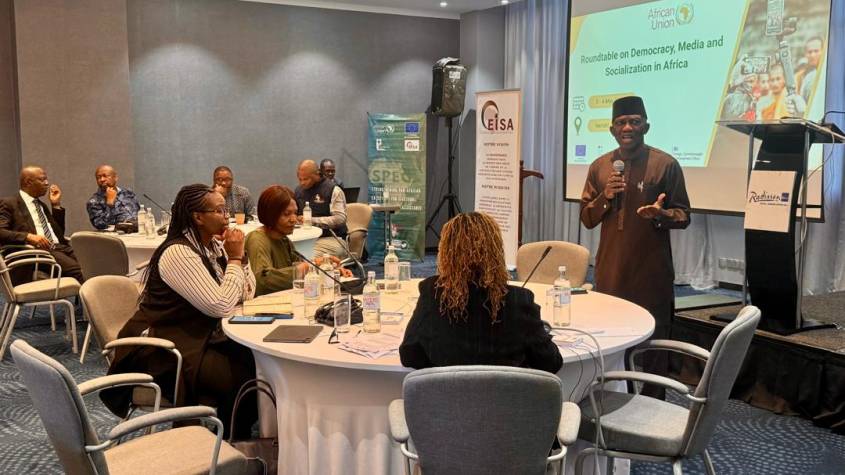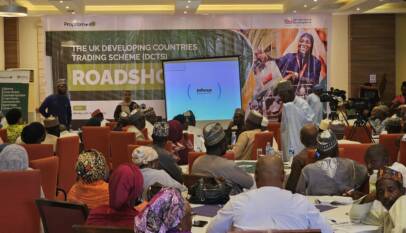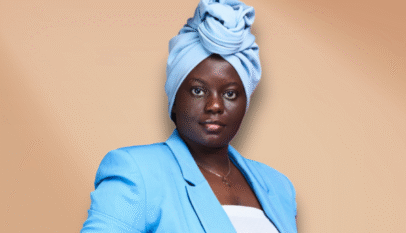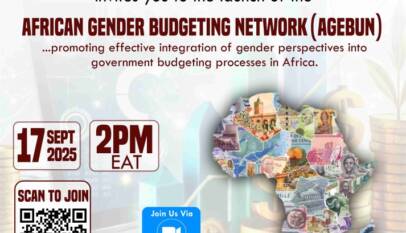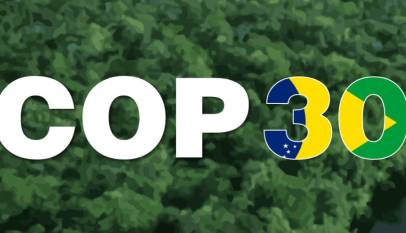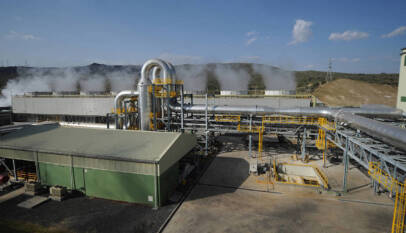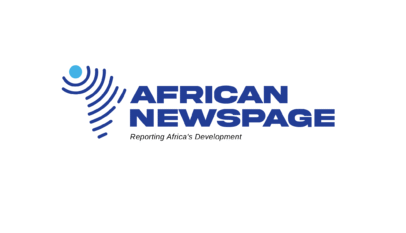AU Press Freedom Day 2025 Convening Spotlight Daily Struggles of African Journalists
On May 3, the African Union convened the crème de la crème of African media leaders to mark the 2025 World Press Freedom Day, followed by a two-day roundtable on media and democratic socialization, which reaffirmed the necessity of defending press freedom and improved working conditions for African journalists.
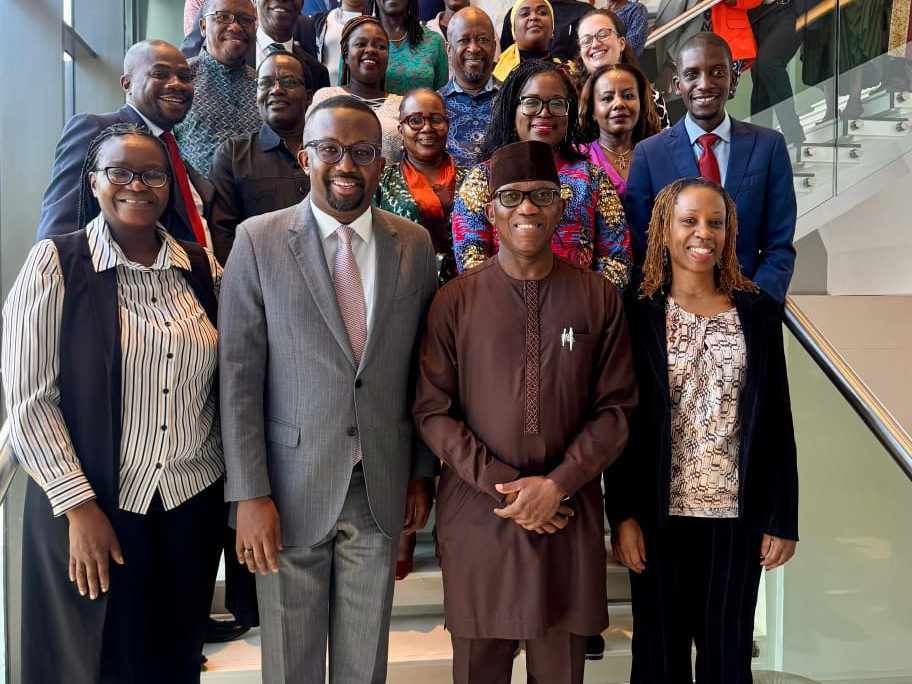
The theme for World Press Freedom Day 2025 was “Reporting in the Brave New World: The Impact of Artificial Intelligence on Press Freedom and the Media.” According to UNESCO, World Press Freedom Day is celebrated every May 3 as a reminder to governments of the need to respect their commitment to press freedom as well as a day of remembrance for journalists who lost their lives in the pursuit of a story.
The African Commission on Human and Peoples’ Rights (ACHPR) also stressed the importance of press freedom and the important role of the media in society and given this year’s theme, noted AI’s potential influence on the work of the media and its potential to enable journalists to handle and process vast amounts of data efficiently and create content more effectively. Therefore, ACHPR encouraged the media to make ethical use of AI systems in their operations and be a watchdog that reports on AI’s risks for society as well as its opportunities.
In the same vein, the African Union’s Department of Political Affairs, Peace and Security (PAPS) on May 3 convened the crème de la crème of African media leaders in Nairobi, Kenya, to commemorate the auspicious day and launched a programme on Democracy, Media and Socialisation. The convening was followed by a two-day roundtable discussion on the role of the media in democratic socialization in Africa, which featured frank dialogue between the AU, democratic actors, and media actors on the role of media in democratic socialization. The roundtable was supported by the International IDEA and the Electoral Institute for Sustainable Democracy in Africa (EISA).
The roundtable was premised on the media’s complementary role in Africa’s democratization, i.e, creating a platform for democratic and media actors to co-create interventions for promoting democracy on the continent. It also assessed challenges and opportunities for building more resilient democracies through the media. In essence, the convening sought to redefine the media’s role in building a strong democratic culture and thus designed an implementation matrix of joint interventions by democratic actors and the media in Africa’s democratization process.
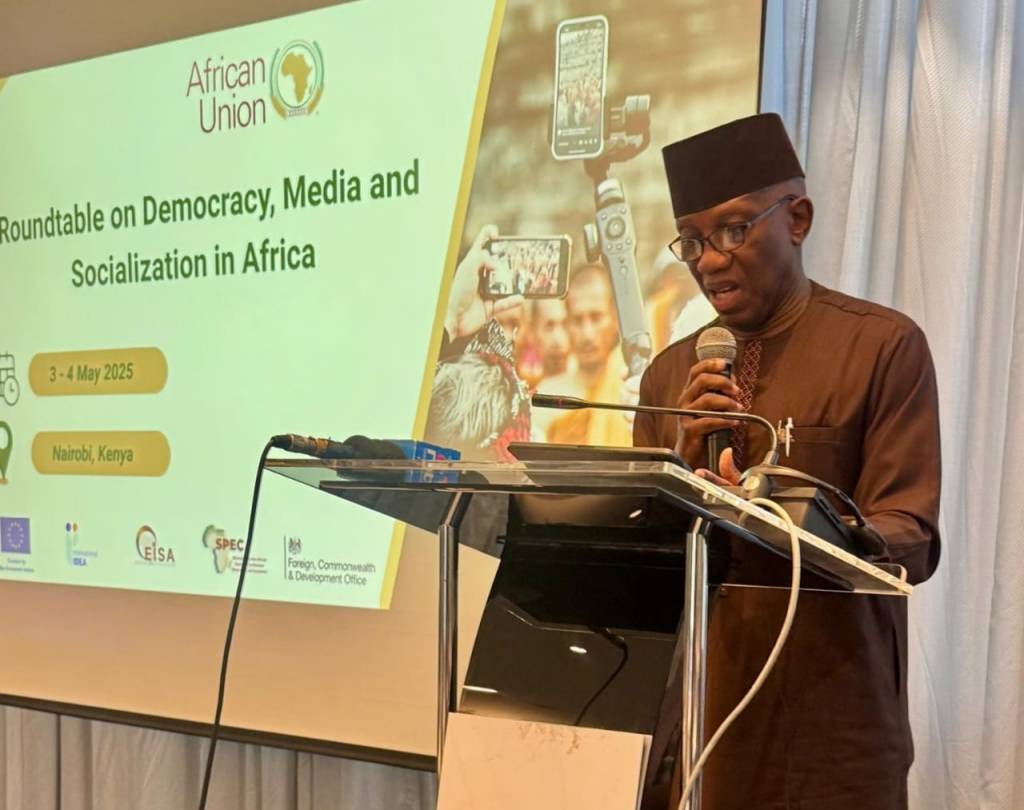
“AI influence journalism, we must embrace it; confront its dangers” – AUC-PAPS Commissioner
In his remarks, Amb. Bankole Adeoye, AU Commissioner for Political Affairs, Peace and Security, said this year’s Press Freedom Day theme on the impact of AI on press freedom and the media was timely in galvanising collective efforts to harness the benefits of AI in improving the accuracy and timeliness of news reporting while addressing the serious threats posed and exacerbated by AI technology, such as propaganda, biased algorithms, disinformation, misinformation, hate speech, and deepfakes, among others.
“AI continues to influence news reporting; we must harness its potential to improve accuracy and timeliness. However, we must also confront the serious threats it poses, such as propaganda, biased algorithms, disinformation, misinformation, hate speech, and deepfakes, all of which undermine the integrity of the media and public trust in democratic institutions,” Adeoye explained.
Against this backdrop, Commissioner Adeoye said the African Union Programme on Democracy, Media, and Socialisation aims to address the dual challenges posed by the misuse of artificial intelligence and the shrinking of media and civic spaces across Africa by empowering journalists with the necessary skills to navigate the digital landscape, where truth is often manipulated.
“It is designed to safeguard democratic systems, promote peace, and ensure accurate, trustworthy reporting. The initiative aims to promote digital literacy, establish frameworks for regulating social media platforms, and collaborate with civil society and tech stakeholders to ensure citizens across Africa receive reliable and factual information,” said the AU Commissioner about the new project.
“Responsible and ethical journalism is crucial in the age of digital media and ‘citizen journalists,’ where the truth is often weaponized. Journalism plays a critical role in advancing democracy and fostering peace, which is why we must ensure that media professionals are well-equipped to face the challenges brought about by new technologies,” Commissioner Adeoye added.
Adeoye noted that crucial AU organs such as ACHPR and the Peace and Security Council (PSC) are in support of journalists’ safety and media freedom, calling on all stakeholders, including AU Member States, to continue to guarantee access to information, freedom of expression, freedom of opinion and ensure the protection and safety of journalists, to promote democracy, good governance, and peace in Africa as enshrined in Agenda 2063.
“In September 2024, the PSC historically underlined its full commitment to the protection of journalists and access to information by adopting the resolution on the protection/safety of journalists in conflict situations. We will be partnering with Pan African media organisations such as the Federation of African Journalists to implement the PSC communique. Furthermore, in March 2025, the PSC approved the establishment of a multidisciplinary Advisory Group on the impact of artificial intelligence on peace, security, and governance in Africa,” recalled Adeoye.
The AU diplomat said it was the continental body’s responsibility to guarantee that the fundamental freedoms associated with access to information, freedom of speech, and freedom of expression are promoted and protected everywhere in Africa. “The press must be champions of the freedom from want. The press should join hands with the AU in championing democracy, effective governance, and most importantly, the right to development,” he concluded.
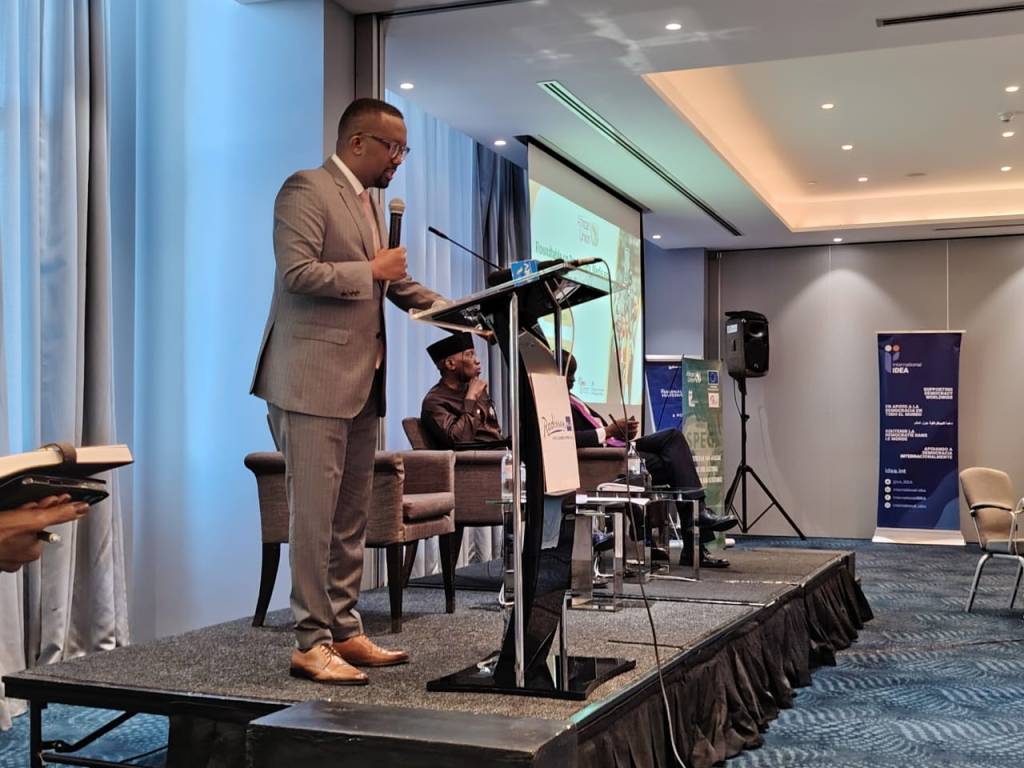
“Journalists not just storytellers; guardians of democracy” – Osman
Omar Faruk Osman, President of the Federation of African Journalists (FAJ), which represents 44 journalist unions and associations across Africa with over 150,000 members, spoke passionately about the critical role of journalists in safeguarding democracy across Africa, In his address, Osman commended African journalists for their courage, resilience, and unwavering commitment to independent journalism noting that their work continues to serve as a cornerstone of democratic progress even amidst significant risks.
“On behalf of the entire African journalist community, the Federation of African Journalists [FAJ] salutes and commends all journalists across our continent for their courage, resilience, and unwavering commitment to truth and public service journalism. Today, as the world marks World Press Freedom Day, we extend a heartfelt tribute to our colleagues—from Cape to Cairo—who persist in defending democracy, giving voice to african peoples, often at great personal risk,” Osman remarked.
The FAJ President applauded the AU Commission’s Department of Political Affairs, Peace and Security for convening the World Press Freedom Day 2025 commemorative activity and specially thank Commissioner Bankole Adeoye for “his principled leadership and dedication to protecting press freedom”, expressing FAJ’s strong support for the AU’s efforts to ensure journalists remain at the center of digital transformations, particularly as AI reshapes how information is disseminated.
“There is no better time to reflect on the role of the media in democracy and society than today. This year’s global theme speaks directly to the opportunities and challenges facing African journalism. As AI transforms how information is produced and disseminated, we urge that journalists be at the centre of this transition, not marginalised by it. We welcome the African Union’s early engagement on AI and its societal impact and call for inclusive deliberations that account for African contexts and realities,” said the FAJ President
Osman said African journalists are being subjected to threats, arbitrary arrests, surveillance and institutional bans, underlining the challenges faced by journalists operating in unstable political environments around Africa, such as Burkina Faso, where the Association des Journalistes Burkinabè (AJB) was disbanded and its leaders forcefully conscripted into the military. He also decried the economic hardships many journalists face, underscoring the importance of fair pay and job security in maintaining editorial independence and the democratic role of the press.
“Equally troubling are the dire working conditions in which many African journalists operate. Without fair pay, contracts, or protection, journalists are forced to accept exploitation as a norm. This economic vulnerability corrodes editorial independence and undermines the democratic function of the media. A journalist who cannot afford to live cannot afford to report freely. Democracy demands a free press—but the press must be both free and secure to function as a democratic pillar,” said Osman.
The FAJ President commended the PSC for its September 2024 deliberations on protecting journalists in conflict zones and ensuring access to information, which he said were not just symbolic resolutions, but rather lifelines that must be converted into tangible protections and state-level commitments.
“Journalists are not only storytellers; they are fighters for democracy, agents of democratic participation, and guardians of transparency. There is no democracy without a free and independent media. We at FAJ uphold internal democracy as well. Just yesterday, our union in Egypt successfully held its elections—demonstrating our deep-rooted commitment to democratic values within our profession.
“Let us be unequivocal: media is not only a mirror of democracy—it is one of its strongest pillars. In times of turbulence, the media provides clarity. In times of division, the media facilitates dialogue. And in times of repression, media dares to hold power accountable. Journalists are not enemies [of state]. We are allies of democratic progress, servants of the public interest and defenders of dignity and human rights,” Osman concluded.
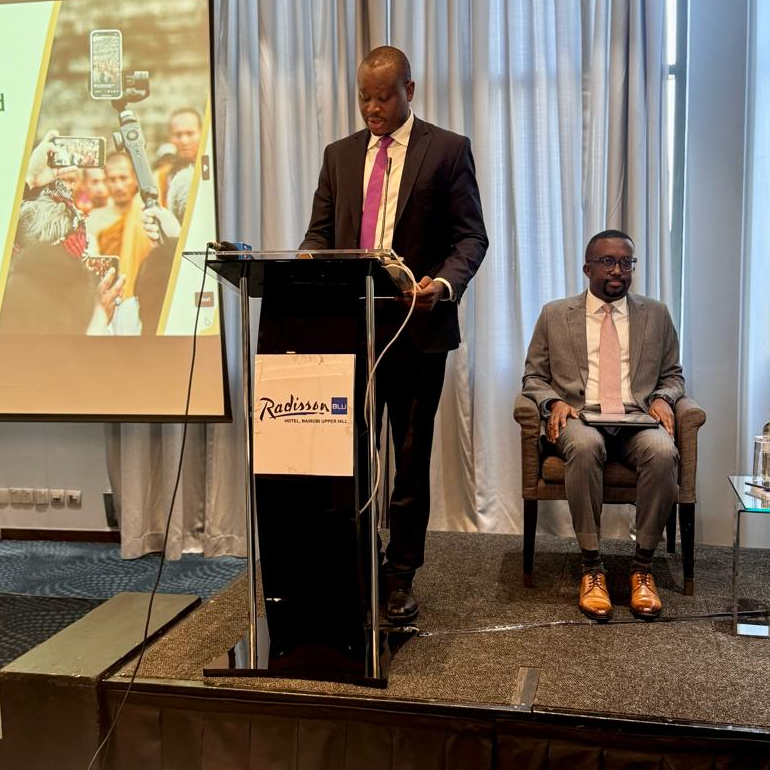
“No democracy without a free, independent press.” – Erick Oduor
Erick Oduor, Secretary-General of the Kenya Union of Journalists (KUJ) cum President of the Federation of Eastern Africa Journalists (FEAJ), delivered a strong appeal for journalist protection and welfare. He decried increased hostility, harassment, and suppression of the media by authorities, and journalists finding themselves on the receiving end of repression as they carry out their duties, including charges against them for simply telling the truth!
“While an adversarial relationship between authorities and the media is expected, accountability is a difficult subject to many, and therefore, we must say no to assault, harassment and intimidation. This important role of holding power to account should not subject these men and women of the Fourth Estate to any form of attack or harm,” cried the FEAJ President.
Odour bemoaned recent worrying trend in East Africa where authorities have unleashed a crackdown on journalists, in some cases leading to shutdown of media houses citing Kenya as a case study of where the British Broadcasting Corporation (BBC) is under pressure over “a bold piece of journalism titled Blood Parliament that detailed police brutality against young protesters last year.”
“This is not acceptable because no country can thrive without a free, independent, and vibrant media. We must encourage bold journalism to keep governments in check and promote democracy and the rule of law. As we mark this year’s Press Freedom Day, let us pay attention to the welfare of journalists as a critical subject to ensure fair pay and respect for their human rights. Journalists must live with dignity where their pay is sufficient to cover their bills. Media cannot be free if we turn a blind eye to the welfare of journalists and media workers,” said Odour.
The FEAJ President ended with a call on the African Union and United Nations to come up with special instruments to guarantee the safety and welfare of journalists and media workers as the surest way to guarantee good governance and safeguard democracy, which are ingredients of peace and stability. “We cannot have peace and stability if journalists work in a hostile environment. The media, on the other hand, must adhere to their true calling. We have to respect our professional code of ethics and remain bold in our work to have an impact on the world.”
Amidst rising concerns over increasing spate of media repression and violation of press freedom around the continent, the rise of AI-generated misinformation and disinformation and the disruptive of power of AI on media businesses in the areas of content creation, distribution, and audience engagement, top African media leaders and democratic institutions at the AU media roundtable made urgent appeals for stronger safeguards and reforms to defend independent journalism and renewed protection of press freedom.
The roundtable reaffirmed the necessity of defending press freedom and improved working conditions for African journalists, climaxing with action points and policy recommendations that will culminate in a Policy Paper to promote media literacy in the digital age; adoption of robust policy frameworks that protect journalists’ freedom and secure their welfare. This is the only path to guaranteeing African citizens continued access to credible news amidst the serious threats posed and exacerbated by AI, disinformation and misinformation.
.

